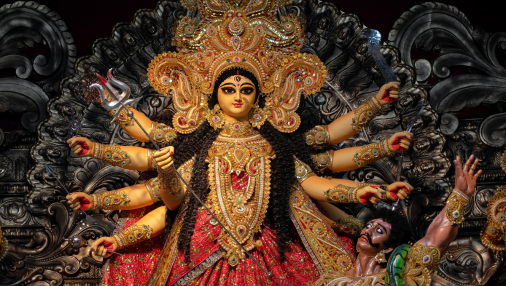Why Celebrate Durga Puja: A Festival of Strength, Devotion, and Culture
Durga Puja, also known as Shakti Puja or Navratri in eastern India, is one of the most vibrant and widely celebrated festivals in India. This festival is dedicated to Goddess Durga, the embodiment of power, courage, and protection. While millions of devotees celebrate it with grandeur in West Bengal, Assam, Odisha, Bihar, and across the world, the significance of this festival goes far beyond the colorful rituals and festivities. It is a festival that blends spirituality, culture, community bonding, and moral lessons.
The Mythological Significance
Durga Puja is rooted in Hindu mythology. According to legend, the demon Mahishasura was a powerful king who could not be defeated by any god or human. His tyranny threatened the cosmos, and the gods combined their powers to create Goddess Durga, a divine force of ultimate strength. Equipped with weapons from each deity, Durga fought Mahishasura for nine days and nights and finally vanquished him on the tenth day, celebrated as Vijaya Dashami.
This story symbolizes the eternal battle between good and evil, reminding devotees that righteousness, courage, and devotion will always overcome injustice and negativity. By celebrating Durga Puja, people honor the victory of good over evil in the universe and in their own lives.
Spiritual Importance
Durga Puja is not just a ritualistic celebration but also a spiritual practice. Devotees engage in prayers, fasting, meditation, and devotional singing (bhajans and aartis) during the festival. Each day of the Navratri (nine nights) is dedicated to a different form of Goddess Durga, such as Shailaputri, Brahmacharini, Chandraghanta, Kushmanda, Skandamata, Katyayani, Kalaratri, Mahagauri, and Siddhidatri.
The spiritual essence of these rituals teaches virtues such as patience, discipline, courage, and humility. It encourages individuals to reflect on their own strengths and weaknesses and strive for inner growth.
Cultural and Social Significance
Durga Puja is also a cultural extravaganza. Communities come together to create pandals (temporary structures), beautifully decorated with themes ranging from traditional to contemporary art. Artisans showcase intricate clay idols of Goddess Durga, adorned with ornaments and vibrant colors.
Socially, Durga Puja fosters community bonding. Families, friends, and neighbors gather to perform rituals, enjoy cultural programs, and share meals. It strengthens social ties, encourages charity, and promotes a sense of unity and belonging.
Economic Impact
Durga Puja has a significant economic impact as well. Artisans, decorators, craftsmen, and local businesses benefit greatly from the festival. From idol making to lighting decorations, catering, clothing, and handicrafts, Durga Puja generates employment and boosts the local economy.
In West Bengal alone, the festival contributes billions of rupees annually to sectors like tourism, handicrafts, and retail. It is not just a religious celebration but also a vital contributor to cultural tourism.
Environmental Awareness
In recent years, Durga Puja has also become a platform for environmental awareness. Eco-friendly idols made from natural clay, organic colors, and biodegradable materials are promoted to reduce pollution. Many communities emphasize water conservation, waste management, and sustainable practices during immersion ceremonies. This modern approach combines tradition with social responsibility.
Celebration Across India and Abroad
While the grandeur of Durga Puja is most prominent in Kolkata, Guwahati, and Patna, the festival is celebrated across India and the world. Bengalis in countries like the USA, UK, Canada, and UAE organize elaborate celebrations to maintain cultural ties. These overseas celebrations help in passing traditions to younger generations, keeping the rich heritage alive.
Personal Significance
For many devotees, Durga Puja is a time of personal reflection and renewal. The festival inspires individuals to overcome personal struggles, face challenges with courage, and seek divine guidance. The joyous environment, rituals, and communal activities offer a sense of emotional well-being and spiritual fulfillment.
Conclusion
Durga Puja is much more than a festival; it is a celebration of life, strength, and unity. It blends mythology, spirituality, art, culture, and social bonding into an event that resonates across communities and generations. By celebrating Durga Puja, people honor the eternal victory of good over evil, strengthen family and community ties, support local economies, and embrace cultural and environmental consciousness.
Whether through prayers, music, dance, or art, Durga Puja reminds us of the power within ourselves to overcome obstacles and celebrate the triumph of positivity, courage, and devotion in our lives.

